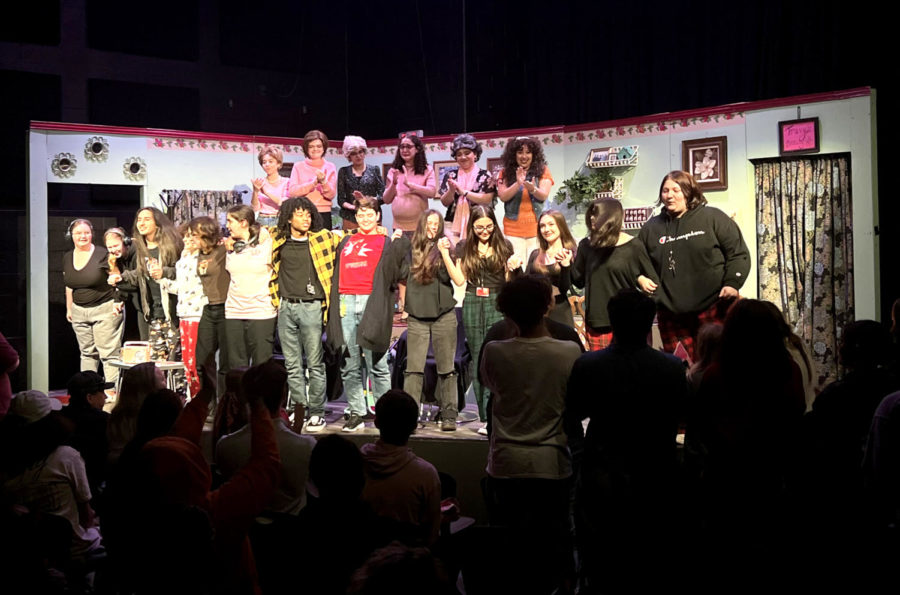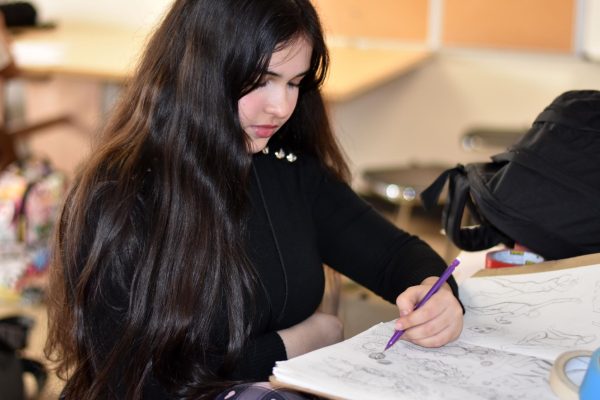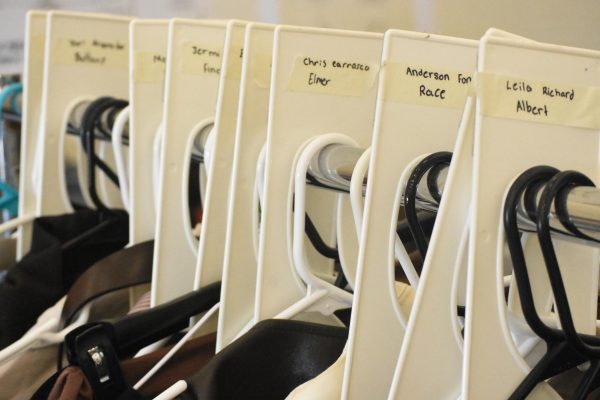All-Female Cast Presents “Steel Magnolias” in Black Box
Cast and crew stand together at the end of the production.
The AHS Theatre’s Black Box production of Steel Magnolias was impressive, to say the least. With limited space and limited actresses, the all-female, 6-member cast portrayed the story within the confines and limitations beautifully, alongside the crew.
The entire play was done between the walls of Truvy Jones‘ home. Scenes were tweaked from the original story to make sense in the setting, and the portrayal of a small-town, in-home beauty salon as a place where the women of the town come together to share their hopes, dreams, worries- and of course gossip- highlighted the relationships between characters. It also showed the acting abilities of the actresses especially well; without the distractions of set changes and side characters, the whole play revolved around their abilities. Each actress adopted a Southern accent for the play, dropping the viewers right into the Louisiana setting.
The play featured Julia Garza as salon owner Truvy Jones, Emerson Knight as newly hired hair assistant Annelle Dupuy, Colleen O’Brien as daughter Shelby Eatenton, Sarah Squires as mother M’Lynn Eatenton, Zoey Robles as grumpy Ouiser Boudreaux, and Emily Riojas as widow Clairee Belcher. Each member of the cast is in each scene (except for O’Brien in the last scene), and they present the growth and development of the characters as the play progresses.
In the first scene, Garza delivers jokes, making the audience laugh as she pretends to work on O’Brien’s hair, whose character is about to get married. The Black Box created an atmosphere that brought the audience into the scene, with the sound of gunshots in the background and the smell of hairspray in the air. The gossip between characters serves as an introduction to the town and the circumstances of the wedding, and while they deliver lines interrogating the new girl Annelle, the cast portrays the personalities of their characters. Partway through this scene, O’Brien’s acting took center stage, as she enacted a hypoglycemia attack that occurs due to Shelby’s Type 1 diabetes. It was undeniably clear from the body language, voices, and facial expressions of the other actresses that their characters know and care about Shelby, as well as how distressed they are by her condition. Knight’s character has a monologue in this scene, where she finally opens up about her past to the ladies around her. In this scene and the following three, Knight was able to show the young girl’s character growth, as she grew from a worried outsider to an open, beloved, God-fearing member of the family.
The second scene was referred to by the crew as the “Christmas Scene.” A married Shelby returns home for Christmas, announcing that she is pregnant. O’Brien and Squires’ back-and-forth dialogue and Garza, Robles, Riojas, and Knight’s supportive dialogue and stances reflected the double-edged nature of the news perfectly. It was clear that while their characters all understood the beauty of new life, they also knew the consequences, that the new baby could cause Shelby to lose her own. It was impressive the way the actresses were able to communicate in this scene, while also staying true to how their characters were feeling. Even as they continued the conversation, it was clear that there was continued tension between the somber Squires and wistful O’Brien, while the other characters were attempting to keep the mood light, despite their worry for their friends. Although none of this was explicitly said, the way each actress wove emotion into the scene through facial expressions, the intentional way they spoke and the movements they made had me in awe of their actions, as well as the actual storyline.
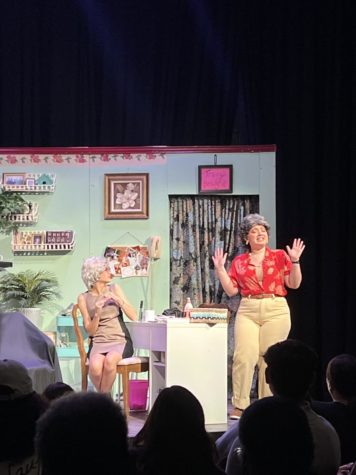
In the third scene, O’Brien has received a new haircut. She portrays her character’s worry over her mother’s reaction, and we can see through this concern that although time has passed and Jack Jr. has been born and is healthy, she harbors a fear of animosity between her and Squires’ characters. Squires’ facial expressions enable the viewer to understand that the mother is shocked by the change in her daughter’s appearance, but appreciates the way she is taking care of herself in her new role as a mother. Facial expressions are key in this scene. Fear and shock are evident on the faces of Garza, Robles, Riojas, and Knight, as the scene reveals to them that Shelby is getting dialysis and requires a transplant, and will be receiving M’Lynn’s kidney. The actresses seem to be constantly in tune with their character’s emotions, which enabled me to feel right along with them the worry and pride that came from the situation.
Going into the fourth- and final- scene, I was afraid that the death scene would be overly dramatic. Having never seen the movie, I wasn’t sure what to expect, but it definitely wasn’t that I would be shaking not with tears, but with laughter by the end. I was very impressed by how they handled the scene, though. Still meeting in the salon, the members of the cast excluding O’Brien (whose character died off-set) gathered one last time as they said their final goodbyes to one of the youngest members of their family. The melancholy atmosphere was smothering. Even the light-hearted characters were grieved by the loss. Knight did a beautiful job of bringing some feeling of hope to the stage, with religion as her solace. Robles was able to show a different side to her character, as she too confessed to being somewhat religious despite her previous statements. Reflecting the way loss changes people, each character took on a new aspect of their personality, and each actress was able to flawlessly portray their abilities to be flexible in character roles. Squires delivered the impassioned monologue of a mother robbed of her daughter, easily the most heartbreaking moment of the play, with the same raw talent that she showed in this year’s earlier production of Mamma Mia. Directly following this moment was one of the best moments in the play, and the one that shocked me the most. Riojas grabbed onto Robles, holding her in front of Squires, begging her to let out her anger toward the world in the form of a punch to the face of the most aloof member of the group with the line “Here, hit this!” The bravado with which she delivered the line and the way Robles fought against her brought all of the energy back into the room. Knight brought it all home with her character’s innocent and heartfelt promise to name her child after Shelby. The way the girls portrayed this scene showed that although the play ended without a resolution of a happy ending of Shelby’s survival, it ended with a beautiful image of a tight-knit group of ladies who care for and about each other.
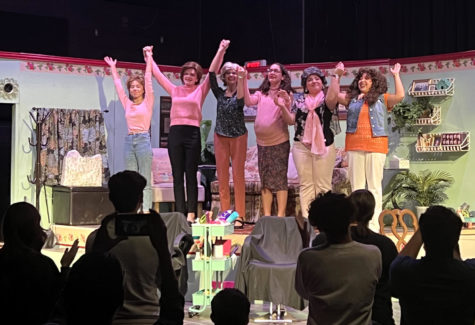
One of the most noteworthy and impressive things about the way the crew interacted with the cast took place on the symbolic radio. Dubbed “Shelby’s Radio” by the end of the play, the radio played in between scenes, providing music while the cast changed costumes and hairstyles and props crew Faith Thompson and Sara Rodriguez shifted items in the set. At the very end of the play, Garza turns the radio on, symbolizing that Shelby will live on in their hearts and the joy she would want them to have. The light and sound crews did a fabulous job of creating an ambiance that fit the theme of the play and that enabled the audience to relax in the Southern town alongside the cast.
The small, female cast enabled a strong bond of friendship to be between the six actresses of the production. From the interactions on stage and the camaraderie after the show, the Black Box performance seemed to be a unifying aspect of this year’s productions. Both funny and heartbreakingly raw, the production was well-done and enjoyable.


